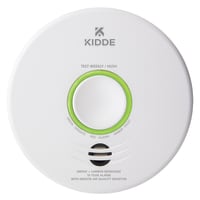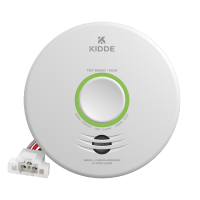Before a Storm Strikes
-
Add at least one battery-operated, UL-listed smoke alarm, CO alarm or combination smoke/CO on every floor of your home and in sleeping areas. Consider purchasing alarms with a 10 year sealed-in lithium battery for continuous power and protection.
-
Test the batteries in your hardwired smoke alarms and replace if necessary.
-
Keep a multi-purpose fire extinguisher, within reach in rooms where fires are most likely to start - the kitchen, garage, bedroom, living room, laundry room and any room with a chimney. If you have an extinguisher, check the gauge to ensure it’s charged. Green = go; Red = replace.
-
When choosing a fire extinguisher, bigger is always better. Larger fire extinguishers last longer, giving you more time to fight the fire and get to safety. Be sure you can physically handle the extinguisher you've purchased.
-
Read the instructions and know how to use the fire extinguisher before a storm hits and a fire breaks out.
-
Ensure that fuel-burning appliances are properly installed and working according to the manufacturer's instructions. Inspect these appliances and ensure they are properly ventilated.
Safety During and After a Storm
-
Do not operate a generator in spaces attached to your home, such as porches, patios or garages. Only operate the generator outdoors in a well-ventilated, dry area, away from air intakes to the home and protected from direct exposure to rain.
-
Follow the manufacturers' instructions when using generators. Use the appropriate sized and type power cords and never run them under rugs or carpets. Overloaded or covered cords could overheat and cause fires.
-
Do not use a charcoal or gas grill inside your home or outside near a window where CO fumes could seep into your home.
-
Ensure that storm debris hasn't blocked or sealed shut exhaust flues or ducts for appliances such as chimneys, water heaters, ranges and clothes dryers, or blocked your vehicle's tailpipe, which could cause CO fumes to build up inside the vehicle.
-
During storm cleanup, place the pump and power unit of high-pressure washers outside and away from air intakes to the home to prevent CO fumes from seeping inside. Run only the wash line inside.
-
Use battery-powered flashlights or lamps for light whenever possible.
-
Extinguish all candles when leaving a room or the house, or when going to sleep.
-
Never use gasoline in place of kerosene. Keep combustible liquids away from heat sources and locked away from children.
-
Use a fire extinguisher to put out a small, self-contained fire when there is a clear exit behind you, or to create a pathway to safety when all exits or escape routes are blocked. Always call the fire department before you try and extinguish a fire yourself.
-
Respect all fires, regardless of size. The main objective is safe escape.
-
Prepare a storm safety kit with necessary supplies. Visit ready.gov for more information.






